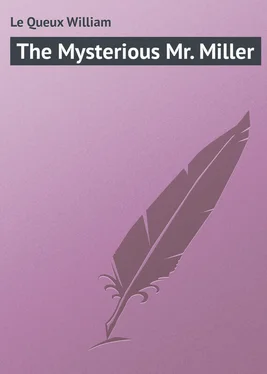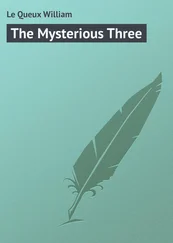William Le Queux - The Mysterious Mr. Miller
Здесь есть возможность читать онлайн «William Le Queux - The Mysterious Mr. Miller» — ознакомительный отрывок электронной книги совершенно бесплатно, а после прочтения отрывка купить полную версию. В некоторых случаях можно слушать аудио, скачать через торрент в формате fb2 и присутствует краткое содержание. Жанр: foreign_prose, на английском языке. Описание произведения, (предисловие) а так же отзывы посетителей доступны на портале библиотеки ЛибКат.
- Название:The Mysterious Mr. Miller
- Автор:
- Жанр:
- Год:неизвестен
- ISBN:нет данных
- Рейтинг книги:5 / 5. Голосов: 1
-
Избранное:Добавить в избранное
- Отзывы:
-
Ваша оценка:
- 100
- 1
- 2
- 3
- 4
- 5
The Mysterious Mr. Miller: краткое содержание, описание и аннотация
Предлагаем к чтению аннотацию, описание, краткое содержание или предисловие (зависит от того, что написал сам автор книги «The Mysterious Mr. Miller»). Если вы не нашли необходимую информацию о книге — напишите в комментариях, мы постараемся отыскать её.
The Mysterious Mr. Miller — читать онлайн ознакомительный отрывок
Ниже представлен текст книги, разбитый по страницам. Система сохранения места последней прочитанной страницы, позволяет с удобством читать онлайн бесплатно книгу «The Mysterious Mr. Miller», без необходимости каждый раз заново искать на чём Вы остановились. Поставьте закладку, и сможете в любой момент перейти на страницу, на которой закончили чтение.
Интервал:
Закладка:
Lucie Miller – the girl whose peril was such a mysterious and yet deadly one – had actually known my Ella. That very fact seemed somehow as a further link between us. What, I wondered, did she know of those later days of my dead love’s life? To me they were shrouded in mystery.
That cold winter’s night in damp, dismal London, when I had met her in secret at the corner of Queen’s Gardens, would ever remain in my memory. She was staying with an aunt in Porchester Terrace, and we had always preserved the secret of our affection. She came dressed in black, wearing a thick veil and carrying a muff in which was a bunch of violets. Her voice, when I greeted her, was, alas! not the same. Quick to recognise that something had occurred, I inquired the reason. Had she had any difference with her father or her aunt – as she sometimes had? No, she said, shaking her head, it was not that.
And then, almost in silence, we strolled on side by side over those wet shining London pavements through the quieter streets and squares of Bayswater, while I glanced wonderingly at her face showing pale behind her spotted veil. At last her trembling hand suddenly rested upon my wrist, and halting she turned to me. In hoarse tones quite unusual to her she blurted forth the truth – the bitter truth that froze my heart. I remember even the spot where we stood, beside a red letter-box at the corner of Chepstow Place. There the greatest blow of all my life fell upon me; and we parted.
I went straight along the Westbourne Grove, blinded by tears. She was to wed the very last man she ought to have chosen. The coarse, fat-necked parvenu had bought her from her father with his gold won in gambles on the Stock Exchange. Yes, my Ella, my sweet-faced love, was not satisfied with the prospect of being the wife of a man comfortably off. Like so many other girls who are dazzled by the lights of life, she longed to shine as a hostess, to wear Paquin frocks and have her portraits in the papers. I was deeply disappointed with her, for, fool that I was, I really believed that she honestly loved me. How often, alas! is a man deceived! I was but one of thousands, after all. And yet I had adored her with all my heart and all my soul.
Away in the country the very song of the birds seemed to be in praise of her – she whose beauty was sweet and delicate as the petals of the flowers; chaste and sweet as the rose itself. Love to the looker-on may be blind, unwise, unworthily bestowed, a waste, a sacrifice, a crime; yet none the less is love the only thing that, come weal or woe, is worth the loss of every other thing; the one supreme and perfect gift of earth in which all common things of daily life become transfigured and divine.
I was crushed, benumbed, broken. At first my brain refused to accept her declaration that that meeting was to be our last, until she told me the truth in all its hideous detail, and that on the morrow her engagement was to be announced in the Morning Post . I opened my lips to upbraid her, but my tongue refused to utter a syllable of reproach. I only bit my lips in silence. Ah! yes, I loved her! – I loved her!
From that moment we never again met. Next day I saw the announcement in the papers, and, disappointed and heart-broken, I went abroad, and it was a year after when one of my intimate friends, Jack Davies, a lieutenant on board the Cornwall , in a letter which I received at a lonely post-house on the snow-bound road in the extreme north of Russia, wrote those words which caused my heart to burst within me: —
“You recollect little Ella Murray, who was, with her stepmother, up at the Grainger’s shoot two years ago? The poor little girl was engaged to some City fellow, an entire outsider, I heard, but I hear she caught typhoid at a hotel in Sheringham and died six months ago. A pity, isn’t it? I rather liked her – so did you, I remember.”
I stood at the door of that filthy, log-built place with the letter in my hand, gazing across the great snow-covered plain with its long row of telegraph-wires and verst-posts stretching away from Pokrovskoi to the grey horizon. My big bearded driver whispered to the post-house keeper, for both saw that I had received bad news. The man in sheepskins who kept the place went in without a word and returned with a glass of vodka. I recognised his kindly thought, gulped down the spirit, and mounting into the sledge drove on – on, whither I did not care. Ella – my own dear Ella was dead!
All this came back vividly to me on that evening as I ate my dinner alone in the little inn at Studland, and then in the golden sunset strolled by the sea – that same wide, mysterious sea beside which I had so long ago declared my love. She lived then, smiling, sighing, loving. But now, alas! she was no more. Of her memory there only remained that shadowy picture that I had seen in Miller’s drawing-room, the portrait of the dead that smiled upon me in such mocking happiness.
I threw myself upon a bank and watched the glorious crimson and purple of the summer afterglow. Yes, the face of the world was for me now changed. The past had been full enough of bitterness, what, I wondered, did the future contain? Ah! if I could have but known at that moment! Yet perhaps after all the Divine power is merciful in keeping from us the happiness and tragedy that lie before.
Till the summer twilight darkened into night I sat therefore before the sea, smoking and thinking. The dark vista of silent waters before me harmonised with my thoughts. Mine was, alas! a wasted, useless life, I had never known one moment’s financial worry, and yet I had somehow never found happiness. In my life where I might be, at home or abroad, there was always something wanting – the love of a good woman.
Through the following day I idled, mostly in the Lion, for it was too hot for walking. But at half-past two I sauntered to the station and, unseen by Lucie, I saw her alight from the train from London, climb into the smart dogcart that was awaiting her, and drive away in the direction of the Manor.
Then when I returned and had my tea I remarked casually to the stout, round-faced innkeeper: —
“I hear that Mr Miller is at the Manor House just now. I learnt so yesterday.”
“An’ so did I,” was his reply. “Dear me! wonders ’ull never cease. Fancy Mr Miller coming back again! An’ they say that Miss Lucie’s a-comin’, too.”
“Is she his daughter?” I inquired, as though in ignorance.
“Of course she is; an’ a very good girl, too. When she’s ’ere – which ain’t very often, more’s the pity – she does a great deal of good in the village – visits the old people, looks after the coal club, and gives away quite a lot of money to the deserving people who are destitute. I only wish there were more like ’er in these ’ere parts.”
“Does she often come here?”
“Oh! two or three times a year,” answered the landlord. “Some say she lives up in London with ’er aunt, and others declare that she’s mostly abroad with ’er father. I believe the latter story. She ’as a foreign way about ’er, and I’ve ’eard the servants say as ’ow all ’er things are made abroad.”
“Then nobody knows her address?” I said.
“Seems not. But she’s very fond of ’er father, and no doubt is always with him.”
“Do they have many friends at the Manor when Mr Miller and his daughter are at home?”
“Not many. Dr Haviland often dines with ’em.”
“I don’t mean local friends – visitors from London.”
“Very few. I’ve known one or two, but they’ve all been forriners. Mr Miller seems to like them forriners some’ow. But I don’t,” declared the old fellow. “They’re too infernal polite and sleeky for me. I wouldn’t trust any of ’em for a pint o’ beer.”
Читать дальшеИнтервал:
Закладка:
Похожие книги на «The Mysterious Mr. Miller»
Представляем Вашему вниманию похожие книги на «The Mysterious Mr. Miller» списком для выбора. Мы отобрали схожую по названию и смыслу литературу в надежде предоставить читателям больше вариантов отыскать новые, интересные, ещё непрочитанные произведения.
Обсуждение, отзывы о книге «The Mysterious Mr. Miller» и просто собственные мнения читателей. Оставьте ваши комментарии, напишите, что Вы думаете о произведении, его смысле или главных героях. Укажите что конкретно понравилось, а что нет, и почему Вы так считаете.












